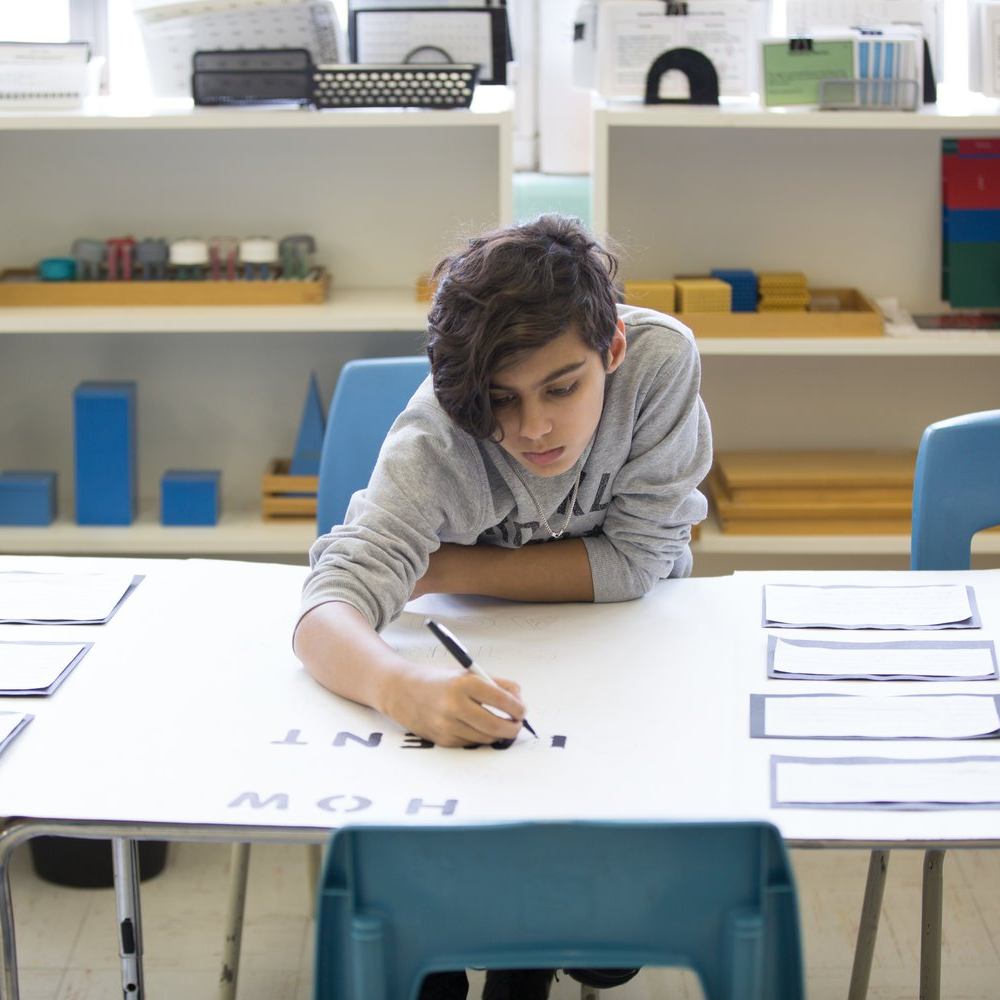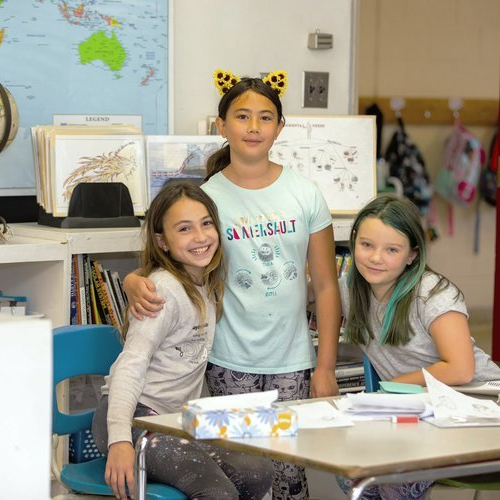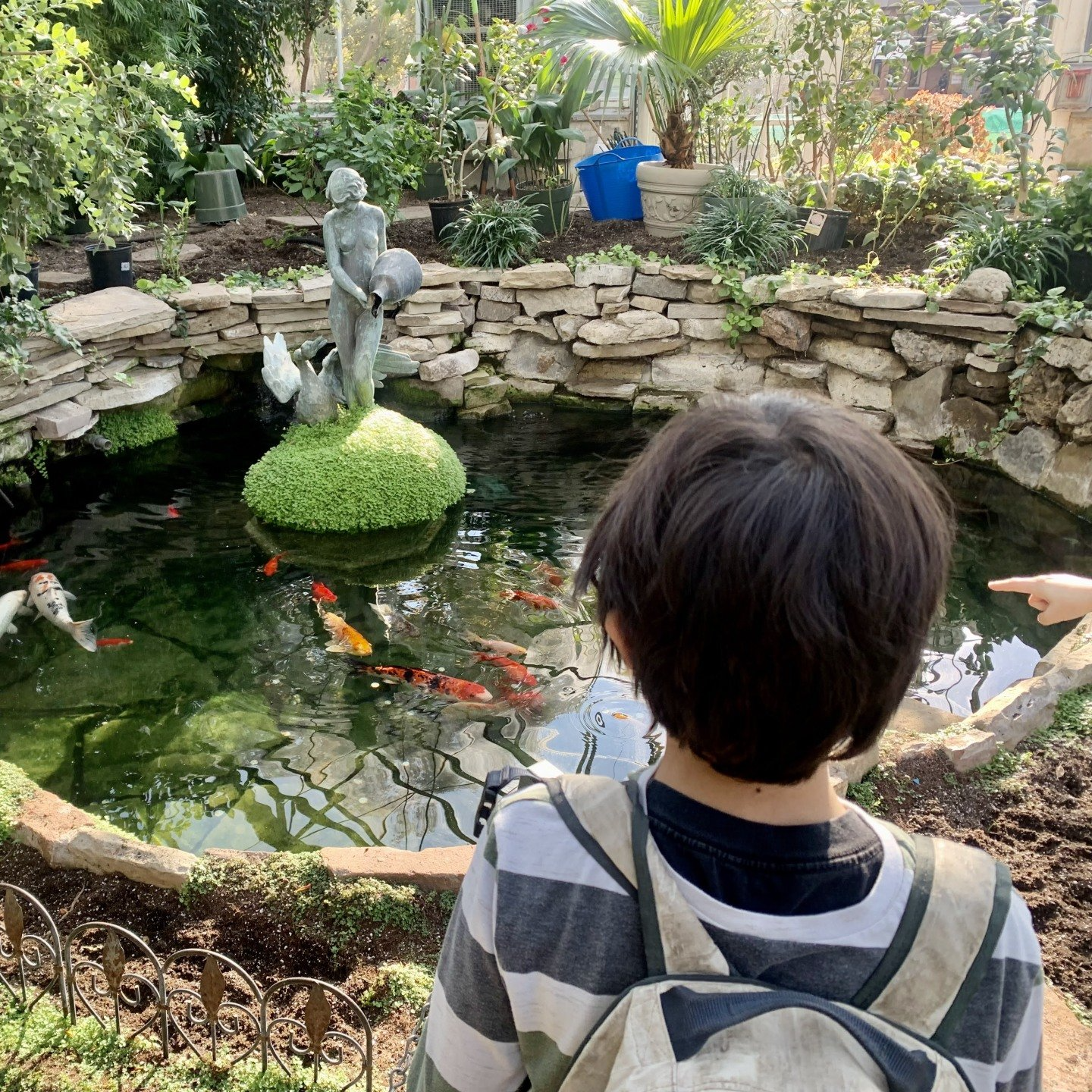Upper Elementary.
9 - 12 years old
“Our aim therefore is not merely to make the child understand, and still less to force him to memorize, but so to touch his imagination as to enthuse him to his inmost core.”
- Maria Montessori
Way of Learning.
Active participants in their classrooms and with their peers, our Upper Elementary children continue their social, intellectual, and moral development. They have been well prepared by their earlier experiences to approach a challenging curriculum of advanced ideas in literature, history, science, mathematics, and language. All students continue to engage in one day per week of Outdoor Education, deepening their relationship with the natural world and situating their learning within a greater context of the human relationship to nature.
As in the Lower Elementary level, our program takes an alternate approach to the “teaching to the middle” practice common in more traditional environments (the education practice of teaching to the average student level in the class, resulting in boredom for those who are more experienced and frustration for those who are less experienced with the subject).
The students receive individual and small group lessons targeted at helping the child reach the next step in his or her own level of development. Individual students are assessed on an ongoing basis to determine comprehension of concepts, level of skill, and the next step that is appropriate for that individual child.
Our children work for understanding and learning, not graded results. They are creative problem solvers who can persevere and take responsibility for themselves and others.
The students build the academic and emotional skills that enable them to adapt and succeed in a range of educational and future professional environments. Our oldest elementary students have consolidated the earlier skills and begin to move towards abstraction, reasoning, and continued experiential learning during this three year cycle.
An ongoing emphasis on independence and responsibility supports the development of life skills that were initiated in earlier years. Through frequent conferences with their teacher, the students monitor their own progress and guidance is provided towards achieving academic balance.
At the conclusion of the full elementary sequence, our children are confident individuals who possess not only a love of learning but the skills to initiate and complete independent work.
The Elementary Montessori Curriculum is vast and includes Language, Math, Science, Social and Cultural Studies.
There is also an intentional approach to moral character development and practical life skills.
School Work.
The curriculum is presented in a variety of ways – through individual and small group lessons specific to particular tasks and skills, and through the annual repeated presentation of the Five Great Lessons to the entire class.
The Great Lessons are an important and unique part of the Montessori curriculum. Presented as stories with demonstrations and illustrations, these lessons are designed to capture the children’s imagination and inspire exploration. Traditionally presented in Lower Elementary, they are presented annually so that children see them more than once. This allows them to experience different aspects of the lesson as their own abilities and awareness have developed. Through these lessons, the elementary child is introduced to a large framework of life, which then allows for the inclusion of the smaller ideas and pieces that form that frame.
The Five Great Lessons consist of:
- The Coming of the Universe and the Earth, leading to the study of astronomy, meterorolgy, chemistry, physics, geology, and geography.
- The Coming of Life, inspiring the study of biology, botany, habitats, ancient life, and animals.
- The Coming of Human Beings, a story presented in a Timeline, leading to further study of history, culture, social studies, invention and scientific revolution.
- The Story of Writing (Communication in Signs), promoting the study of reading, writing, language, and the structure of languages.
- The Story of Numbers, encouraging the exploration of of mathematics, origins of numbers and scientific notation, geometry, and the daily use of mathematics.
Inspired by the Great Lessons, the children engage in the daily work of learning. In each area of focus, the curriculum offers an intentionally structured and progressive program of skill development. These skills are repeatedly practiced in all areas of the curriculum, and true integration of learning occurs. For example, essential language abilities are used to research and present topics of science; the study of geography naturally leads to the building of graphs and charts; the study of an animal delves into art, biology, botany, history, and zoology.
LANGUAGE
The students continue to expand their abilities through the Upper Elementary years, using language to creatively express ideas, communicate across a range of subjects, and comprehend information from a variety of sources. They write every day and on many topics. The rules of written language: punctuation, capitalization, spelling and sentence structure continue to be illustrated through their own work and are reviewed and self-corrected as needed. Oral language skills are built through frequent presentations to peers and speech writing. At the completion of the three year cycle at the Upper Elementary level, the child is expected to read multiple sources fluently, integrate and express ideas across disciplines, experiment with different writing styles, and present written and oral reports.
MATH
During the Upper Elementary years in-depth understanding of abstract concepts and theorems, pre-algebra and algebra, statistics, and geometry is explored. Concrete materials are used to build thorough understanding of concepts which then form a bridge from the concrete to the symbolic as the child masters the concepts. The math curriculum is designed to meet all academic learning styles and abilities. The child who requires additional time to fully understand a concept will have that time. Children who grasp the concept quickly and are ready for more challenging work will move on to new challenges. The children continue to work with advancing understanding of the four operations: addition, subtraction, multiplication, and division using whole numbers, decimals and fractions. They will also consolidate the rules for factors and multiples, use numbers as data and present information in graphs and charts, measure and explore angles and geometric shapes, and understand concepts of equivalency, congruency, symmetry and similarity.
SCIENCE, SOCIAL AND CULTURAL
At the Upper Elementary level, the students begin to use experimental methods to study the natural sciences. Hypotheses are developed, experiments are designed to test assumptions, data is observed and analyzed, and conclusions are presented in formal scientific reports. Research topics of particular interest to the children themselves means there is no limit to the range of projects that will be undertaken. The integrated curriculum explores history, geography, science, anthropology, commerce, literature, the arts, and music. History is grounded by the use of large time-lines that give children a visual impression of pre-historic life, the world of early people on earth and the emergence of some of the first civilizations. Geography materials illustrate the birth of planet Earth, its place in the universe, and how it contributed to the history of humankind. Science experiments help the child to understand the laws of the Universe, including, for example, the rotation of the Earth, friction, gravity, and the interdependence of species.
MORAL DEVELOPMENT AND PRACTICAL LIFE
The character building aspect of the curriculum recognizes the child’s early interest in an ethical value system and social rules in the community. As the children work collaboratively together, they also learn to live together in a community. Focus is placed on negotiation of social issues with appropriate adult support. Children learn conflict resolution skills, appreciation and respect for individual differences, and responsibility for each other and their environment. Children are also taking on increasing independence and responsibility for their learning, making choices about activities, completing tasks, and understanding natural consequences of choices.
The progression through the Lower and Upper Elementary years enables our students to explore endless topics and subjects, while building essential skills for lifetime learning and development.






